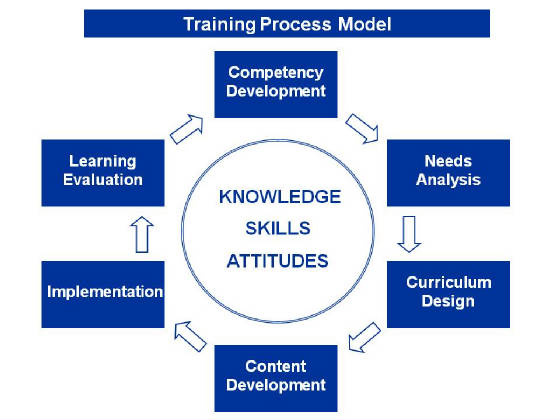Competency Development
A competency is a broad grouping of knowledge, skills, attitudes along with inherent
talents that enable a person to be successful in a particlar role or responsibility. A competecy description employs language
that clearly describes the specific component behaviors that constitue that competency. "Organize and maintain
a system of records to enable easy access to customer histories," for example, would be a component behavior of the competency
of planning and organization. Competency development is the starting point in creating an
effective training program. It defines the objectives of a learning initiative. It specifically describes
what the desired performance behavior should look like and sound like. It projects what the desired learning results
should be. In defining performance competencies, we focus extensively on gaining consensus among all stakeholders
in order to ensure that learners clearly understand what is expected of them and to minimize any future inconsistencies
in the coaching and evaluation of performance behaviors.
Needs Analysis
Needs analysis is an examination of the existing need for training within an organization.
It compares the desired performance level (determined through competency development) to the current performance level
to identify the performance gap(s). Needs analysis determines what a proposed training initiative content should be
and sets the stage for the design and development of the program curriculum. We belive that needs analysis is a
step that is often not explored effectively. Many times training content is determined from unproven assumptions
rather than from an effective needs analysis. This can cause resources to be directed toward the wrong objective
resulting in a waste of valuable time and energy.
There are
other situations where a training initiative is selected to fix a performance issue when in reality, the problen is
not the result of a knowledge, skills or attitude deficiency. The critical issue may lie in one or more areas
of management that can directly affect an individual's performance. These may include issues relating to compensation levels, hiring
practices, organization culture and many others. There is a saying
that "if the only tool a person has is a hammer, then everything is a nail." Similarly, if training is the
only discipline an organization does, then every performance problem will be a training issue. Since we at Symbiont
Performance Group possess expertise in general performance consulting as well as training, we are able to help
distinguish between training and other performance improvement needs, and will be able to advise clients acordingly.
see Performance Consulting.
Curriculum Design
The
curriculum design phase of training focuses on creating the blueprint for the proposed performance improvement initiative.
The fundamental function of curriculum design is the determination of the format of the individual elements that will comprise
the proposed training as wells as their interrelationship. Basic format options for training include instructor-led formal
classroom training, learner-directed manual-based or computer-mediated training, synchronous or asynchronous distance training, facilitated group discussions as well blended learning initiatives which involve various combinations of the above. Curriculum design includes the selection of appropriate
media (audio or video), materials (computers, manuals, learning aids, etc.), instructional techniques (lecture, simulation, role play) and learning transfer methods. It also includes the development of the training plan or agenda. Our approach at Symbiont Performance
Group is to work with clients to design curricula that best meet organizational need. To accomplish this
we take into account the needs, attitudes and preferences of learners and work to leverage the organizations learning
resources.
Development
Content Development
Training content development
consists of acquisition and/or creation of each of the training program components identified in the curriculum design phase.
Curriculum development often involves working with subject matter experts from within and/or outside the organization to capture
specialized knowledge for inclusion of the training content.
Implementation
All the aspects of a training program
come together during the implementation phase. The
implementation phase is the point of impact for all of the time and effort devoted to the development of a training program.
While the implementation phase must be well-planned, appropriately structured and practiced, it must also allow for adaptation
to special situations that arise during content delivery. No two groups of learners have the same training needs,
learning styles or motivation. Hense, skillful trainers, facilitators and training project managers must be continually on
the watch for issues that call for modifications in the training implementation plan. Furthermore, the greater the
level of anticipation of and preparation for such occurences, ther greater will be the overall level of success of a training
initiative.
Learning Evaluaton
Learning evaluations help measure the value and effectiveness of
a training program. Learning evaluations use assessment tools to provide data for the evaluation. At Symbiont
Performance Group we apply the evaluation model developed by Donald Kirkpatrick, Professor Emeritus
of the University of Wisconsin in North America and a past president of the American Society for Training and Development
(ASTD). The Kirkpatrick training evaluation model employs the following four levels of training evaluation:
Level
1 Evaluation - Participant Reactions
This level measures
the participants' reaction to the training program. It attempts to answer questions regarding the participants' perception.
It only reflects the degree to which participants liked the training; it doesn't address the overall effectiveness of the
training. However, the participants' reaction can be an important indicator, especially if their reactions are negative.
Although a positive reaction does not guarantee learning, a negative reaction certainly can reduce its possibility.
All of Symbiont's training initiatives employ levelone evaluation.
Level
2 Evaluation - Learning
Level 2 assessments measure the
extent to which the learning objectives of a training initiative have been met. They attempt to assess the extent
participants have advanced in the targeted knowledge skills and attitudes, i.e., have participants learned what the were supposed
to learn. Measurement at this level is more difficult than level 1 evaluation. Instruments to perform level 2 evaluation include various forms of tests and ideally, the implementation
of both pre and post tests to determine the amount of learning that has occurred. One of our strengths at Symbiont
Performance Group is our expertise in creating effective and relevant level 2 assessments.
Level 3 Evaluation - Learning (Training) Transfer
Level 3 evaluation measures the degree of learning transfer, the
extent to which the learning acquired in the training is incorporated into job respoinsibilities. This level represents
a significantly more relevant level of evaluation because it measures the degree to which participants have actually learned
to do what the were expected to learn to do. However, this level of evaluation is challenging because it is often difficult
to predict the point when the desired change in performance behavior will be evident, and therefore, requires important decisions
regarding when to evaluate and how to evaluate. Because this level of evaluation is so valueable, we routinely incorporate
level 3 evaluation methodologies into our training programs.
Level
4 Evaluation - Results
Level 4 evaluations attempt to assess
training in terms of business results, i.e., return on investment. This level of evaluation measures a training program
in terms that managers can understand. Level 4 measures would include metrics dealing with such factors
as increased sales, increased production and improved quality. This is the best the most relevant level of evaluation
because it addresses the reasons the training was implemented in the first place. Level 4 evaluation techniques can
include post-training surveys, follow-up needs assessments and interviews of trainees and managers. The biggest
challenge associated with level 4 evaluation is being able to determine that there was a valid cause-effect
relationship between the training and any improved outcomes that occur.

